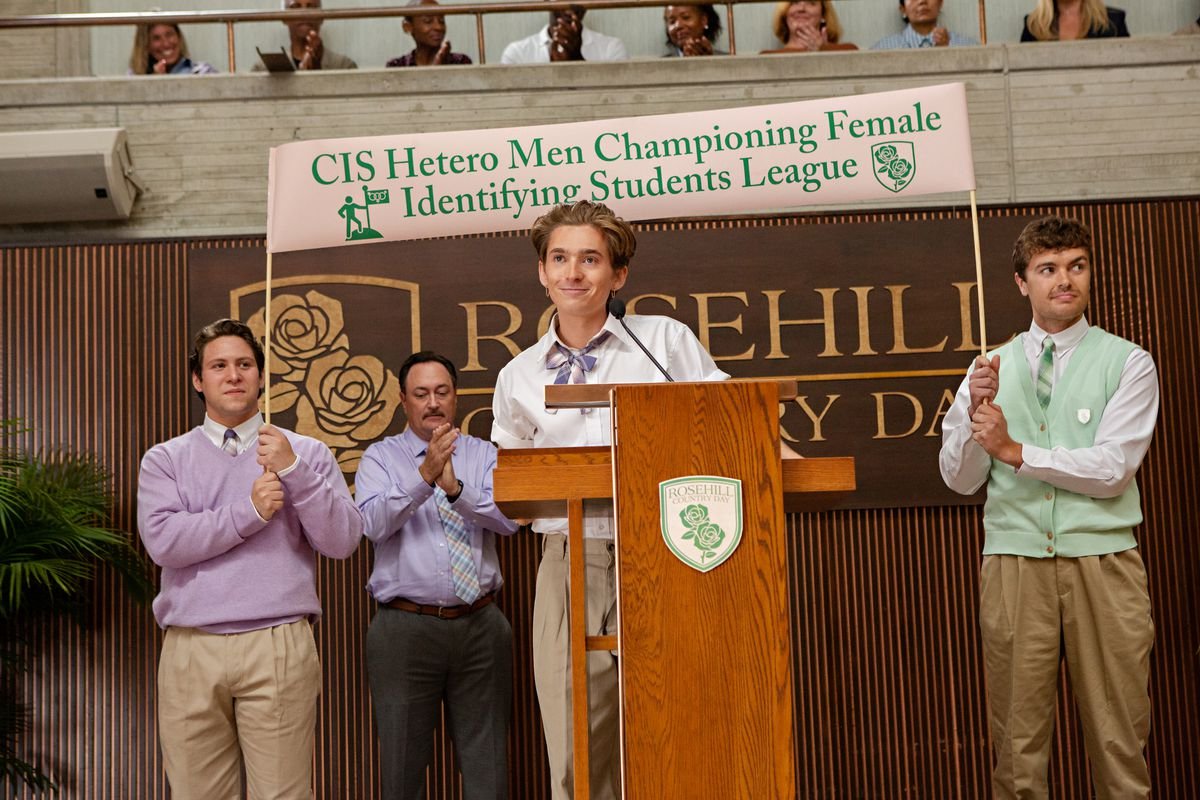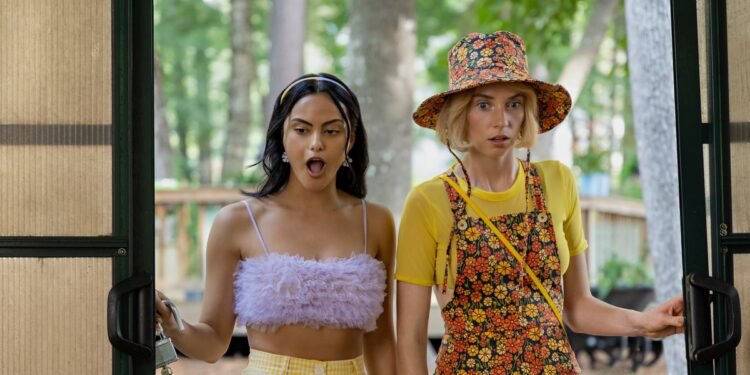Alfred Hitchcock’s influence is apparent in Netflix’s teen dark comedy Do Revenge. It was inspired by his 1951 thriller Strangers on a Train, which was in turn inspired by a novel by The Talented Mr. Ripley writer Patricia Highsmith. But instead of focusing on a twisty murder scheme, Do Revenge centers on a plot to kill off the social status of two members of the It Crowd.
The film neatly fits into the canon of dark comedies about the ruthlessness of teenage girls — think Heathers or Mean Girls. Director Jennifer Kaytin Robinson (co-writer of Thor: Love and Thunder, creator of Sweet/Vicious) weaves a sharp 2022 update of the genre. A few romantic subplots slow the movie’s midpoint down, but by the end, the movie regains its momentum and pulls together for a satisfying ending.
[Ed. note: This review contains setup spoilers for Do Revenge.]

Photo: Kim Simms/Netflix
Do Revenge follows Drea (Camila Mendes), formerly the most popular girl at school, until her reputation tanks — not just because her ex-boyfriend Max released her sex tape, but also because she punched him in the face afterward. Drea attends her exclusive Miami prep school on a scholarship, while her ex (Austin Abrams) comes from a wealthy family. He has more social capital than her, so he’s able to turn his friends and the rest of the school against her, claiming a video from his phone got leaked and that she assaulted him for no reason. Drea just wants to grit her teeth and get through senior year, but that changes when she meets transfer student Eleanor (Maya Hawke).
Years ago, Eleanor became a social pariah when her crush Carissa (Ava Capri) spread a rumor that Eleanor held her down and forcibly kissed her. After landing at the same school as Carissa, Eleanor dreads seeing her again. After an emotional moment in the bathroom, Eleanor and Drea bond over the people who’ve wronged them, and hatch a plan for revenge — but with an important caveat. The two decide to swap vengeance targets: Drea will take down Carissa, while Eleanor will infiltrate Max’s friend group for ultimate revenge.
Like other movies in the mean-girls high school subgenre, Do Revenge focuses on convoluted social plots and vicious popular cliques. But it isn’t derivative or a cliche: Instead, it’s a natural evolution of this type of movie for 2022. Some parts of high school are constants, but youth culture rapidly evolves, so teen movies — especially ones adapting or paying homage to older material — risk feeling outdated. Do Revenge dodges that curse because of the way Robinson and co-writer Celeste Ballard smartly update certain plot points.

Photo: Kim Simms/Netflix
For one thing, Max is a villain for 2022 — a good-looking straight rich white boy who uses performative public wokeness to hide his real motives. And as a privileged young man, Max is basically untouchable. But that just means Drea and Eleanor have to come up with an even more enjoyably complex plan to take him down — and initially, it makes them easier to root for.
But as their actions escalate, their obsessions grow. Hawke and Mendes do a fantastic job of never giving the audience a clear person to root for. At first, their friendship seems inspired, as they unite against those who wronged them. But then it turns one-sided and toxic. And then it mutates into something else entirely.
It’s a hell of a ride, all done with soft, influencer-worthy pastels. Part of the reason movies like Heathers and Mean Girls became so iconic was because of their strong visual palettes, which played with the conventions of idealized teenagehood in their respective eras. Do Revenge continues the trend, updating the film’s look for those intimately acquainted with perfectly calibrated aesthetics that fit neatly under social media hashtags, whether it’s “Instagram witch” or #glamgirl.

Photo: Kim Simms/Netflix
When the movie focuses on the revenge plots, or Eleanor and Drea’s increasingly toxic relationship, it’s sharp and tight. But midway through, a few romantic B-plots start taking center stage. Drea gets involved with a friend of Carissa’s, rebellious artist Russ (Rish Shah), while Eleanor flirts with Max’s sister Gabbi (Talia Ryder). While some of those scenes are sweet, neither of these relationships do much to make Eleanor or Drea either more sympathetic or more despicable. They seem to exist out of a sense that teen movies need obligatory romances, and nothing more. They end up dragging the movie out and slowing it down.
At the end, though, the movie shifts back to Eleanor and Drea — and for the better. A series of twists and turns draws them back together, and they play off each other in deliciously unnerving ways. At some points, the movie seems like it’s going to turn into a moralizing statement about the dangers of revenge, especially when Drea’s college plans become jeopardized. But Robinson and Ballard smartly avoid those pitfalls, proving they understand what the audience for these sorts of movies really wants: the vicarious thrill of watching vicious teenage girls go to great lengths to get what they want, while navigating the complicated relationships they form with one another. Without spoiling too much, Eleanor and Drea get both what they desire, and what they deserve. It’s a satisfying conclusion that doesn’t punish them or extol them. Just ignore the cheesy epilogues where they woo their prospective love interests.
Do Revenge debuts on Netflix on Sept. 16.
























































